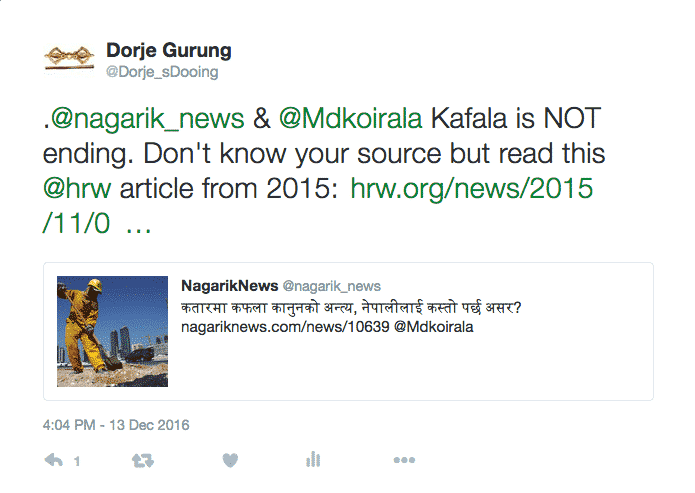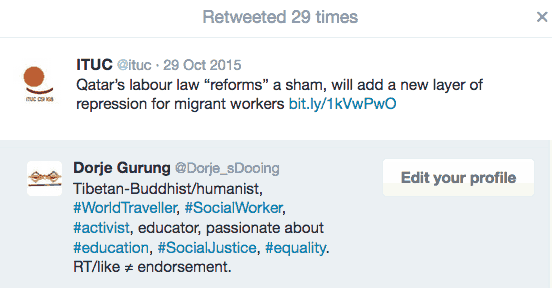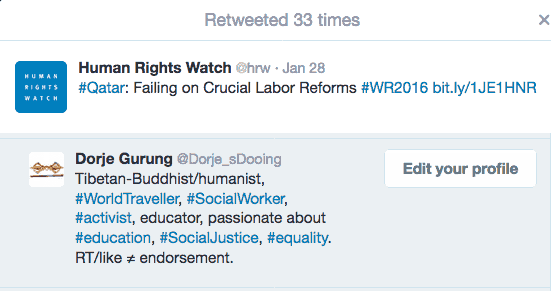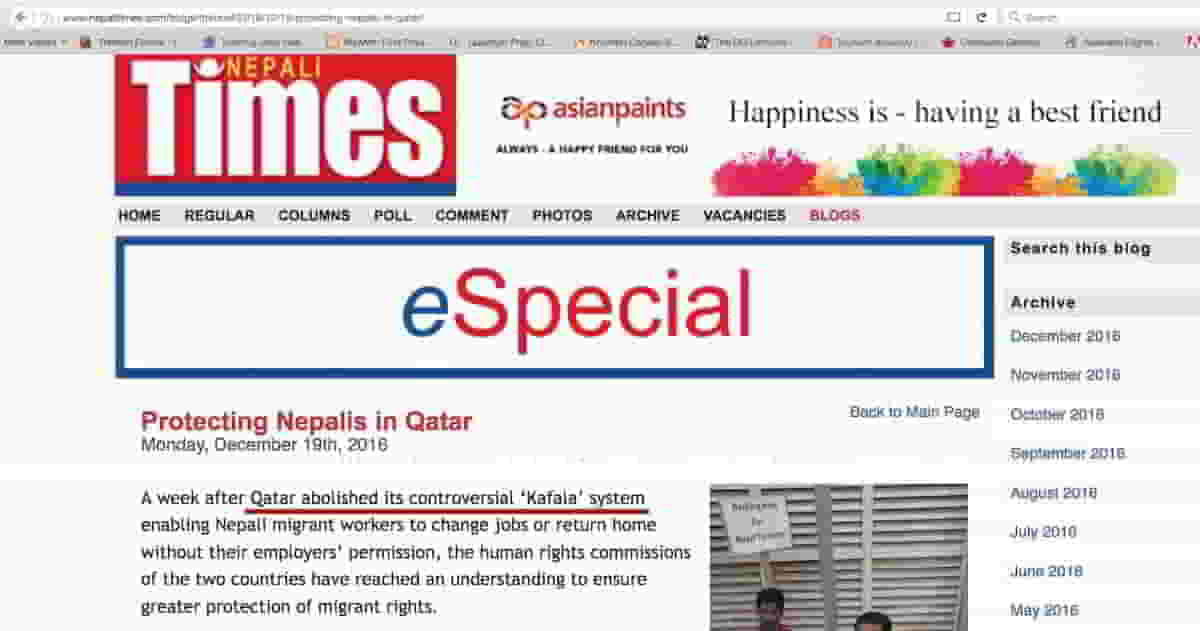Let me repeat, again: If you have read somewhere that Qatar has abolished the peculiar labor law (system) that binds all workers in the Gulf country to a Kafeel (a sponsor), called Kafala, IT IS NOT TRUE!
When this morning I discovered yet another Nepalese paper reporting that Qatar had abolished the Kafala system, I had to correct them. (See image above for the wording in the Nepali Times article.)
.@nepalitimes, contrary 2 ur contention, #Kafala system has NOT been abolished. Words changed, system intact. Read 11/2015 @hrw report. https://t.co/WXdArM9q7J
— Dorje Gurung (@Dorje_sDooing) December 20, 2016
I tweeted a link to the Human Rights Watch (HRW) report from November 2015, which describes, in detail, the relevant contents of the new law unveiled that fall but only came into effect this month as per their implementation timeline.
.@nepalitimes Here for your benefit is the @hrw report from last year. https://t.co/XySqXyJCb2
— Dorje Gurung (@Dorje_sDooing) December 20, 2016
After doing that, I wondered if this reporting was considerably more widespread since I had seen the same kind of wording in articles I had read earlier.
The first news media outlet I had come across, which reported the end of the system, was BBC back in December 13. The BBC headline screamed “Qatar abolishes controversial ‘kafala’ labour system.”
BBC headlining “#Qatar abolishes controversial ‘#kafala‘ labour system” NOT TRUE! https://t.co/mU7yz8smGY
— Dorje Gurung (@Dorje_sDooing) December 13, 2016
And yet, the article went on to describe how rights workers are saying that there has been NO change in the system, forget about abolishing it!
The next one, My Republica, a national daily here in Nepal, had also used pretty much the same headline, replacing “controversial” with “dreaded.”
@Dorje_sDooing Any workers mistreated will automatically be allowed to change jobs, said officials. https://t.co/iuYcuYua86
— Ashok Dahal (@ashokpillar) December 13, 2016
Here too, I had tweeted a link to the HRW report from November 2015 describing the issues with the new law.
.@ashokpillar Not quite. Here are the details of the new law unveiled a year ago (for implementation now). https://t.co/XySqXyJCb2
— Dorje Gurung (@Dorje_sDooing) December 13, 2016
My Republica’s sister publication Nagarik News also had a Nepali version of the same news, headlining “Kafala ends in Qatar, how does that affect The Nepalese?” I tweeted drawing their attention to the HRW report.

The Kathmandu Post, however, had written a considerably more accurate article on the subject, which I shared with Nagarik News and the author of their article.
.@nagarik_news @Mdkoirala Or read this Kathmandu post article for details. @hrw https://t.co/v8KjKXVtrv?
— Dorje Gurung (@Dorje_sDooing) December 14, 2016
The Kantipur Post journalist appears to have actually done his homework contacting rights workers and getting feedfack from them. Here’s a quote from the article.
‘Nicholas McGeehan, Qatar researcher for Human Rights Watch, said that it would be apt to describe the new laws as “old wine in new bottle.” “Qatar has just given the dreadful “kafala” system a new name in the hope that people will be too stupid to notice. Nepal and other countries that send young men and women to Qatar should be making their objections loud and clear,” McGeehan told the Post in an email interview.’
Discovering the Nepali times article this morning, it occurred to me that the misreporting must be rampant! So I did a quick search. I Googled “qatar kafala system.”
Sure enough, pretty much every article published on — or since — December 13 uses the word “abolished” or “abolishes” in their headline!
One article that came out this month, however, goes into the details of the issues with the law. Published in Dohanews.co, on Dec. 13, it headlined Rights groups skeptical as new labor reforms take effect in Qatar.
When unveiled, back in 2015, HRW (Qatar: New Reforms Won’t Protect Migrant Workers), Migrant-Rights.org (Qatar: Renaming Kafala is not Ending Kafala) and International Trade Union Confederation (ITUC) (Qatar’s labour law “reforms” a sham) had blasted the law. (Click here for the original Arabic version of the law.)

HRW followed up their November report with another one in January 2016.

Here’s the most important paragraph from the report.
‘In October, Qatar’s Emir, Sheikh Tamim bin Hamad Al-Thani, issued Law No. 21 of 2015, regulating the entry and exit of repatriates and their residency. The new sponsorship law refers to “recruiters” instead of “sponsors” but leaves the fundamentally exploitative characteristics of the kafala system in place. Workers must still obtain a“No Objection Certificate” from their employer if they want to transfer legally to another employer. Workers also must still obtain exit permits from their employers to leave Qatar. The new law provides a grievance committee for cases in which sponsors refuse to grant exit visas, but the arbitrary restriction on a worker’s right to leave the country remains in place.’
So, the point is, Qatar has NOT abolished the Kafala system.
The reason for the interest of the Nepalese in the labor laws in Qatar is the presence of half a million of our fellow citizens in the country, a significant number of whom suffer all the time, many of them from the Kafala system.
It was the Kafala system that trapped Roshan Kumar for more than a decade in a deportation center! It was the Kafala system that trapped these Nepalese worker in an untenable situation. It was the Kafala system that prevented the Nepalese in Qatar from returning home to tend to their families in the aftermath of the April 25 and May 12 earthquakes last year.
And those are only the ones I have blogged about! (To be sure, Nepalese and other migrant workers in Qatar (and elsewhere in the Gulf) suffer for myriad of other reasons too, of course!)
If you are interested in reliable news out of the gulf about migrant rights and labor laws, here are their names and their twitter handle:
- Dohanews.co (@dohanews)
- Shabina Khatri (@shabinakhatri)
- Human Rights Watch (@hrw and @hrwdispatches)
- Nicholas McGeehan (@NcGeehan)
- Migrant Rights.org (@MigrantRights)
- Vani Saraswathi (@vanish_forever)
- International Trade Union Confederation (@ituc)
- Aakash Jayaprakash (@Aakash_Jay)
- James Lynch (@jpmlynch)
I rely on them because I have a some history with some of them. Dohanews is the online Qatar paper which, by breaking my story of my incarceration in Doha back in 2013, initiated the beginning of the end to my ordeal! Shabina Khatri did that write-up as well as a couple more about me and my ordeal, which helped spread the word of my predicament around the world.
Nicholas, Vani, James and Aakash were involved in rescuing Roshan Kumar from his nightmare! After publishing his story, I got in touch with all of them, including Shabina, via Twitter, and they managed to get Kumar out of Qatar within a month!
And of course, if you read some of the articles, you would have also noticed that a couple of them were the ones quoted.
Follow them and trust them to produce and provide reliable news about what’s going on with labor-related issues in the region.
Jan. 5, 2017 Update
Dohanews reports that two recent changes have been introduced to the new law. The first change reverts the law back to how it used to be: expats need permission from employer to leave the country. The second, an improvement from before, expats who want to quit their jobs and leave has recourse: they can petition “the grievance committee” for help, instead of simply “absconding” and being an illegal as was the case in the past for lack of options.

